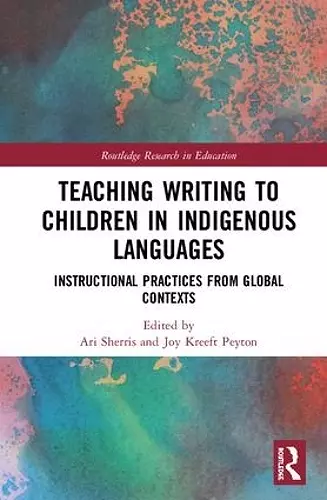Teaching Writing to Children in Indigenous Languages
Instructional Practices from Global Contexts
Joy Kreeft Peyton editor Ari Sherris editor
Format:Hardback
Publisher:Taylor & Francis Ltd
Published:11th Feb '19
Currently unavailable, and unfortunately no date known when it will be back
This hardback is available in another edition too:
- Paperback£38.99(9780367661755)

This volume brings together studies of instructional writing practices and the products of those practices from diverse Indigenous languages and cultures. By analyzing a rich diversity of contexts—Finland, Ghana, Hawaii, Mexico, Papua New Guinea, and more—through biliteracy, complexity, and genre theories, this book explores and demonstrates critical components of writing pedagogy and development. Because the volume focuses on Indigenous languages, it questions center-margin perspectives on schooling and national language ideologies, which often limit the number of Indigenous languages taught, the domains of study, and the age groups included.
As the world cascades toward sameness in languages, this volume puts up a huge stop sign. With convincing historical accounts and a wide range of instructional practices, this book is an absolute must-read for any social scientist or linguist. Dedicated to language revitalization, the experts represented here stress the vitality of entry into the social and cognitive worlds of children from different cultures through a substantial dedication to writing and reading.
Shirley Brice Heath
Margery Bailey Professor of English and Dramatic Literature; Professor of Linguistics, Emerita
Stanford University
This exciting book focuses on an under-researched topic that fills a hole in the fields of both literacy education and language revitalization – teaching the writing of Indigenous languages to children. Centering on the role of literacy education in language revitalization, the chapters range the world, with chapters on languages with millions of speakers, to a handful from revitalizing writing systems that have a past history of literacy, to new orthographies developed for the first time for re-awakening languages. Importantly, attention is paid to debates over possible negatives of putting oral languages to paper, but shows the importance of writing for the survival of endangered languages, for many reasons including (re)valorization, revival of genres, increased functions of the language, and present-day communicative needs. While both written documentation and orthographic development have been topics of research and activism in language revitalization, this volume is a very welcome first, with its emphasis on the pedagogy of writing.
Leanne Hinton
Professor Emerita, University of California, Berkeley
The UN has issued alarming declarations about the state of learning for disadvantaged linguistic minorities. UNICEF[1]<
ISBN: 9781138485358
Dimensions: unknown
Weight: 458g
296 pages